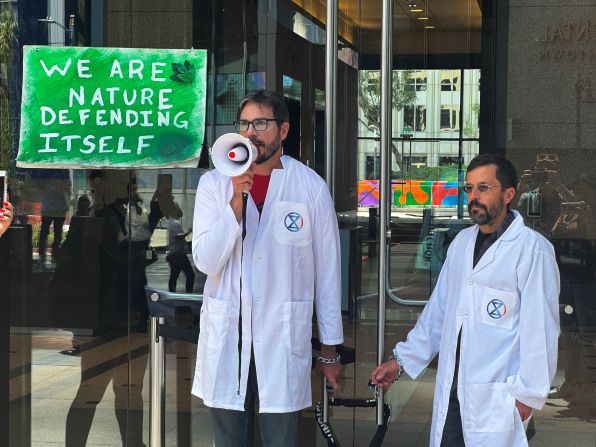Our Inevitable Climate Crisis

For the past 3 years, COVID has been at the forefront of every news feed. This caused other world issues to be pushed into the background and forgotten about. One of the most important world issues, climate change, has resurfaced due to many scientists speaking up and protesting.
Over 1,000 scientists from 25 different countries protested in the first week of April after the release of the Intergovernmental Panel on Climate Change’s new report. It reported that quick and deep cuts to greenhouse gas emissions are necessary by 2025 in order to avoid catastrophic climate events. A group called the Scientist Rebellion responded to the failures of the Intergovernmental Panel by stating that the “current actions and plans are grossly inadequate, and even these obligations are not being met.”
One of the more recognized protests is the protest in which scientists chained themselves to the door of a JP Morgan Chase building in Los Angeles. One of the scientists, Peter Kalmus, a NASA climate scientist, teared up during his speech to the public. “We’ve been trying to warn you guys for so many decades. The scientists of the world have been ignored. And it’s gotta stop. We’re gonna lose everything.” The scientists were arrested by almost 100 police officers in riot gear.
The fact that NASA scientists are so horrified about our future to the point of tears, has made many people around the world speak up about the extremities of climate change. Many protesters brought attention to the extreme situation by taking extreme acts. For example, German protesters glued themselves to a bridge, and Spanish protesters threw fake blood over the outside of the Spanish parliament. Other Scientist Rebellion protesters in Washington chained themselves to the White House front gate.
All these extreme acts of protests were organized in order to convince world governments to take more aggressive action towards this climate crisis. Some might think that these actions are ‘too extreme’ or are ‘interrupting people’s lives’. But it raises the question, should we trust the thousands of actual scientists who are trying to save the world from a climate catastrophe? Should we treat this as an extreme situation, because if we don’t, it will lead to crisis events like increased heat, droughts, and insect outbreaks? Should we be more worried about our future, or your day being slightly inconvenienced by scientists waving the warning signs for the entire world to see?






